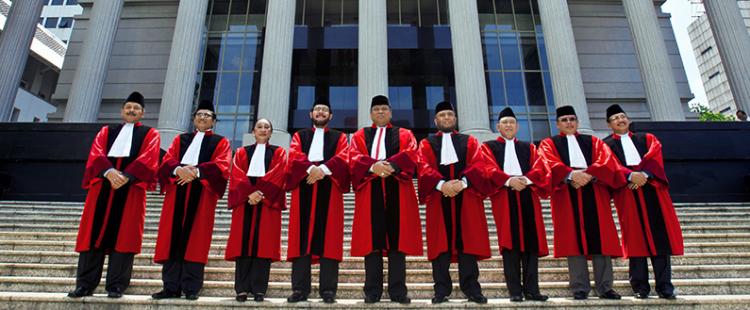In-Depth Analysis: Selection of Constitutional Judges

After the arrest of Constitutional Judge, Patrialis Akbar, by the Corruption Eradication Commission in January 2017, the Constitutional Court is in need of a constitutional judge to assume the position vacated by Patrialis. A new judge is immediately required, as it is expected that cases involving disputes related to regional elections (Pilkada) will appear in due course.
The position must be filled immediately as the number of remaining constitutional judge is only 8 judges. This condition definitely does not allow decision making when examining petitions of election disputes, or reviews of legislations. The Constitutional Court therefore asked President Jokowi to immediately find a replacement for Patrialis Akbar. As is known, the 9 constitutional judges are selected by three state agencies, namely the President, the Supreme Court, and the House of Representatives. In choosing a replacement for Patrialis Akbar, the authority belongs to the President, as Patrialis was appointed by former president Susilo Bambang Yudhoyono. The authority to replace him thus belongs to the President.
At the request of the Constitutional Court, President Jokowi immediately designated 5 persons as the Constitutional Judge Selection Committee. The Selection Committee is chaired by former Constitutional Judge Harjono, and consists of Sukma Violetta (Judicial Commission), Maruarar Siahaan (Former Judge of the Constitutional Court), Todung Mulya Lubis (Advocate), and Ningrum Sirait (Academic). The Selection Committee promplty announced the vacancy and registration for potential candidates of judges to replace Patrialis.
At least there are 45 candidates registered in the selection. However, only 12 persons passed the administrative selection. The twelve names will then be interviewed by the Selection Committee. The Selection Committee also cooperates with the Corruption Eradication Commission in tracing the track record of candidates for the judges.
To ensure that the selection is done openly, the Selection Committee provides an opportunity for the public to attend the selection interview. In this stage, the public can ask questions directly to the candidates and test the commitment and integrity of the candidates. Unfortunately, because of time constraints, the selection is rather hasty and somewhat neglects the quality aspects. The selection did not sufficiently dig up the perspective and quality of the candidates in terms of understanding of the issues in the community.
Constitutional judges will be confronted with many problems pertaining to state issues. Apart from having to master the constitution, constitutional judges are required to understand and follow development of laws and the society. In the future, there should be an evaluation of the selection method of constitutional judges by giving priority to quality aspects. (Arad/Agus)










